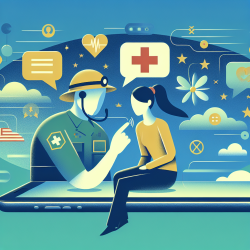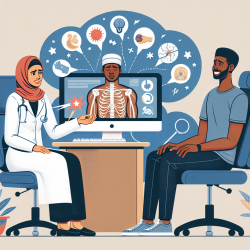Introduction
In the evolving landscape of mental health care, digital solutions are becoming increasingly vital. A recent study, An E–Mental Health Solution to Prevent and Manage Posttraumatic Stress Injuries Among First Responders in Alberta, highlights the potential of text messaging services to support first responders dealing with posttraumatic stress injuries (PTSI). This blog explores how practitioners can leverage these findings to enhance their therapeutic strategies and improve outcomes for their clients.
The Research Overview
The study, conducted in Alberta, Canada, focuses on implementing two SMS-based programs, Text4PTSI and Text4Wellbeing, designed to support first responders. Participants receive daily supportive and psychoeducational messages over six months. The research aims to assess the impact of these messages on PTSI symptoms, stress, anxiety, and depression, alongside user satisfaction.
Key Findings
The research suggests several positive outcomes for participants:
- Improved PTSI symptoms and overall quality of life.
- Significant reduction in stress, depression, and anxiety symptoms.
- High satisfaction rates among users, indicating the acceptability and effectiveness of the program.
Implications for Practitioners
Practitioners can draw several actionable insights from this study:
- Integrate Digital Solutions: Incorporate SMS-based interventions as a supplement to traditional therapy, especially for clients who may face barriers to in-person sessions.
- Focus on Accessibility: Utilize digital platforms to reach clients in remote areas or those with limited access to mental health services.
- Enhance Engagement: Use personalized and supportive messages to maintain client engagement and reinforce therapeutic concepts between sessions.
Encouraging Further Research
While the study presents promising results, it also opens avenues for further research:
- Longitudinal Studies: Investigate the long-term effects of SMS-based interventions on PTSI and other mental health conditions.
- Broader Populations: Expand research to include diverse populations and settings to validate the effectiveness of these interventions across different demographics.
- Integration with Other Technologies: Explore the integration of SMS services with other digital tools, such as mobile apps or teletherapy platforms, to create a comprehensive digital mental health ecosystem.
Conclusion
Text messaging services like Text4PTSI and Text4Wellbeing offer a promising adjunct to traditional mental health care, particularly for first responders facing PTSI. By integrating these digital solutions, practitioners can enhance their therapeutic toolkit, improve client outcomes, and contribute to the broader field of e-mental health.
To read the original research paper, please follow this link: An E–Mental Health Solution to Prevent and Manage Posttraumatic Stress Injuries Among First Responders in Alberta: Protocol for the Implementation and Evaluation of Text Messaging Services (Text4PTSI and Text4Wellbeing).










